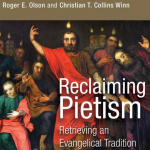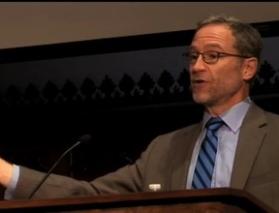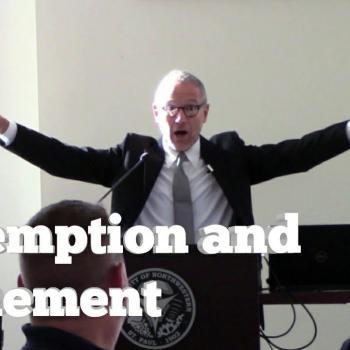A selection from my current work in progress, Hands of Faith: A Historical and Theological Examination of the Two Kinds of Righteousness:
The teaching of the twofold righteousness is not merely an academic one, but is immensely practical. Lutheran pastors sometimes feel constricted in preaching on specific good works for fear that doing so will result in legalism and displacing the central article of justification. With this distinction, however, the pastor is given the tools whereby the Christian’s good works can be helpfully explained in the Christian life, while retaining the central reality of justification coram Deo. As Luther and other Lutheran fathers were bold in proclaiming the importance and necessity of good deeds from the pulpit, so should the pastors of the Lutheran church today, so long as they continually emphasize the sole saving efficacy of faith before God.
Though passive righteousness is the primary context in which the pastor is placed in relation to the congregation, he is also called to equip and encourage the congregants unto lives of active righteousness in the world. The pastor is not primarily placed in his office to be a motivator to the congregation, but he must teach people that the passive righteousness received in faith always leads to active righteousness of love out in the world. An understanding of active righteousness solves several common congregational issues in Lutheran churches. Understanding active righteousness will give the people an understanding that the Christian faith affects all areas of their lives, not simply Sunday mornings. It also puts the mission of the church in reaching out with works of love and service in a proper and helpful context. Finally, teaching active righteousness helps to build the understanding of the church as a community.
It is a constant danger in the Lutheran church for people to assume that the Christian faith is only relevant to their lives on Sunday mornings. Because of the emphasis the church places on the forgiveness of sins, there are many congregants who go to church Sunday mornings to receive their forgiveness for the week in the sacrament and then leave the service ready to ignore their Christin faith until the next Sunday morning. They simply have no place for the Christian life in their daily activities, because what is talked about in church is the relationship one has with God, but during the week, one has to focus on their relationship with fellow human persons. It is easy for one to assume that the Christian faith is not relevant to ordinary life.
An understanding of active righteousness, especially in the context of vocation, will give the congregants a manner in which they can connect the forgiveness received on Sunday to their active life in their jobs, families, and communities. Luther argued that the faith has a profound impact on daily living, because God has called Christians into various vocations in the world. These vocations are opportunities to serve one’s neighbors, as God uses people as his own hands to serve the world. Pastors need to teach on this doctrine of vocation on a regular basis. The congregants need to understand that the Bible speaks, not only to their relationship with God in the church, but to their place in the broader community. The grace of God gives one motivation to serve the neighbor in their job, and also within the family life. Paul gives extensive exhortations to husbands, wives, parents, and children (Eph. 5:21-6:9). This need not happen in the context of motivational speeches during the Sunday service on how to be a good father, or husband. But as does Paul, the pastor can give such admonitions in light of the free forgiveness of sins that comes through the Gospel.
















